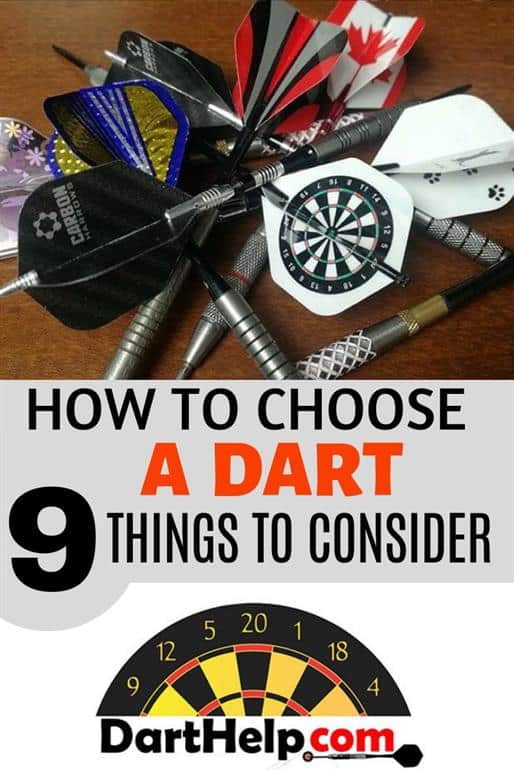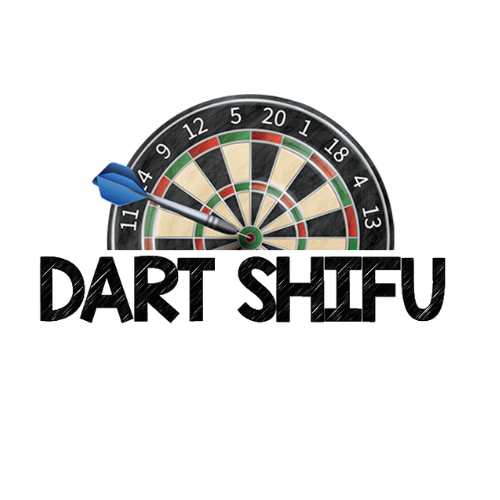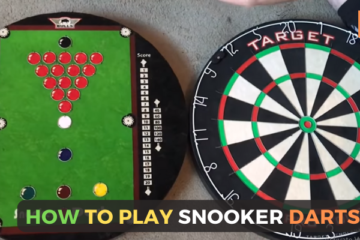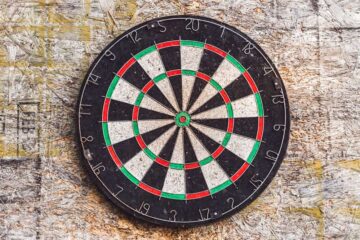To choose the right dart weight, consider your throwing style, preferences, and experience level. We’ll explore the factors to consider before determining the ideal weight for your darts.
When it comes to playing darts, finding the right dart weight is essential. The weight of a dart can significantly impact your accuracy and throwing technique. Choosing the right weight is a matter of personal preference and depends on various factors such as your throwing style, level of experience, and the type of game you play.
We will discuss the key considerations to help you select the perfect dart weight to enhance your performance on the dartboard. By taking these factors into account, you can make an informed decision and improve your overall game.

Credit: www.dartscorner.co.uk
Understanding Dart Weight
Choosing the right dart weight is crucial for any dart player. The weight of a dart can significantly impact your accuracy, control, and overall performance. Understanding the importance of dart weight and considering the key factors when choosing one will help you make an informed decision and improve your game. In this article, we will delve into the topic of dart weight and provide you with the essential information you need to select the right weight for your darts.
The Importance Of Dart Weight
Dart weight plays a vital role in determining your throwing technique, control, and consistency. It affects how the dart feels in your hand, how it travels through the air, and how it lands on the dartboard. The right weight will allow you to achieve a comfortable grip and release, resulting in better accuracy. Additionally, the weight of your dart can help compensate for any inconsistencies in your throw, making it easier to find a consistent throwing motion.
Factors To Consider When Choosing Dart Weight
- Playing Style: Your playing style is one of the primary factors to consider when deciding on dart weight. If you have a smooth and gentle throw, a lighter dart may be more suitable. On the other hand, if you have a more forceful and aggressive throwing style, a heavier dart may provide more stability.
- Grip Preference: Determine how you grip the dart. If you tend to grip it towards the front, a lighter dart may feel more comfortable. However, if you grip it towards the back, a heavier dart can help create a better balance.
- Strength and Stamina: Consider your physical strength and stamina level. If you have less strength or tire easily, a lighter dart will allow you to play for more extended periods without straining your arm. Conversely, if you have good strength and stamina, a heavier dart may provide more control and accuracy.
- Experience Level: If you are a beginner, it is generally advisable to start with a mid-range weight dart, around 20-22 grams. As you gain experience and improve your throwing technique, you can experiment with different weights to find the one that suits you best.
Remember, the right dart weight is a matter of personal preference. It may take some trial and error to find the weight that feels most comfortable and enhances your performance. Don’t hesitate to test a variety of weights to discover the one that allows you to throw with confidence and accuracy. With the right dart weight, your game will reach new heights.

Credit: darthelp.com
Finding Your Ideal Dart Weight
Choosing the right dart weight is crucial to improving your game and enhancing your performance. It’s not as simple as picking up any dart and expecting to excel immediately. Your personal playing style, grip, and physical attributes all play a role in determining the ideal dart weight for you. In this section, we’ll explore how you can find your ideal dart weight by experimenting, considering your playing style and grip, and seeking professional advice.
Experimenting With Different Dart Weights
If you’re new to darts or looking to fine-tune your game, experimenting with different dart weights is a great place to start. By trying out different weights, you can get a feel for what works best for you. Begin by selecting a range of weights, such as 18g, 20g, 22g, and 24g, and spend some time practicing with each one.
During your practice sessions, pay attention to how comfortable the darts feel in your hand. Notice how easily you can maintain a steady grip and release the dart smoothly. It’s essential to find a weight that allows you to maintain control and accuracy, as well as minimize any fatigue during extended play. Take note of any patterns or improvements in your performance with different weights to help guide your decision-making process.
Considering Your Playing Style And Grip
Your playing style and grip also play a significant role in determining the ideal dart weight. Different grip styles, such as front, middle, or rear, will benefit from different weights. Furthermore, your release technique and throwing motion can influence the optimal weight for your darts.
For example, if you have a fast and aggressive throwing style, a slightly heavier dart might help stabilize your throw. On the other hand, if you have a slower and more controlled style, a lighter dart may allow you to maintain better precision and accuracy. Understanding how your playing style and grip interact with different weights will provide valuable insights into which one suits you best.
Seeking Professional Advice
While experimenting and considering your playing style are great starting points, seeking professional advice can provide further clarity and guidance. Professional dart players have extensive experience and knowledge and can offer valuable insights into finding the right dart weight.
If possible, consult with a professional dart player or a knowledgeable expert at your local dart shop. They can analyze your throwing technique, observe your grip, and provide personalized recommendations based on your unique characteristics. Their expertise can help you narrow down your options and make an informed decision, giving you the confidence to choose the perfect dart weight for your game.
Tips For Choosing The Right Dart Weight
When it comes to dart throwing, finding the right weight for your darts is essential. A dart that is too light may not carry enough momentum to hit the target accurately, while a dart that is too heavy can make it difficult to maintain control. To help you select the perfect dart weight, we have compiled some useful tips that will improve your game.
Start With A Moderate Dart Weight
When you begin your dart throwing journey, it is best to start with a moderate dart weight. This allows you to develop proper throwing technique and build muscle memory without compromising control or accuracy. A weight range of 18 to 20 grams is typically recommended for beginners, as these darts strike a balance between lightness and stability.
Gradually Adjust The Weight Based On Performance
As you become more comfortable with your dart throwing technique, you can start experimenting with different dart weights to find what works best for you. If you find that your darts consistently fall short of the target, it may be an indication that you need a slightly heavier dart. Conversely, if your darts frequently overshoot the mark, you might want to try a lighter weight. Remember, small adjustments can make a big difference in your performance, so be patient and take note of the results.
Consider The Dart Weight Recommendations Of Experts
Expert dart throwers and professional players have years of experience and knowledge when it comes to selecting the right dart weight. Taking their recommendations into account can be immensely helpful in narrowing down your options. You can seek advice from experienced players at your local dart club or consult reputable online resources where experts share their insights. Considering these recommendations can save you time and effort in finding the ideal dart weight that aligns with your playing style and skill level.

Credit: www.linkedin.com
Frequently Asked Questions Of How To Choose The Right Dart Weight
Is A Heavier Or Lighter Dart Better?
Heavier darts are better for experienced players who have a strong throw, while lighter darts are preferred by beginners and players with a gentler throw. It’s important to choose a dart that suits your throwing style and feels comfortable in your hand for better accuracy.
Is 25g A Heavy Dart?
No, 25g is not considered a heavy dart.
How Many Grams Is A Good Dart?
A good dart typically weighs around 20-26 grams. The weight preference may vary depending on individual playing style and skill level.
Is There A Regulation Weight For Darts?
Yes, there is a regulation weight for darts. The standard weight for a dart is 18 grams, but it can range from 17 to 20 grams.
Conclusion
Choosing the right dart weight is crucial for your darts game. It can significantly impact your accuracy, control, and overall performance. By considering factors such as your skill level, throwing technique, and personal preference, you can find the perfect dart weight that suits you best.
Remember to test different weights and practice consistently to improve your skills and find the perfect balance between power and accuracy.


